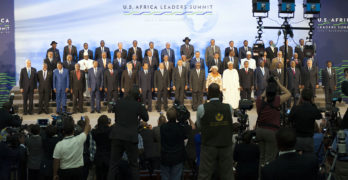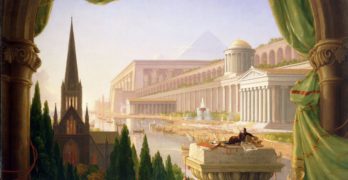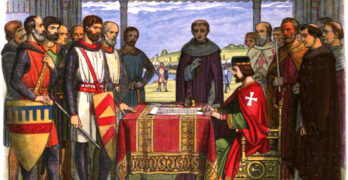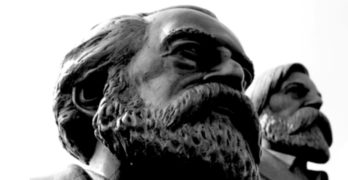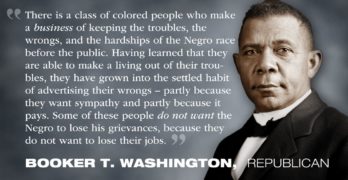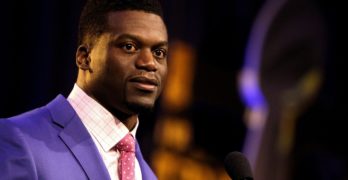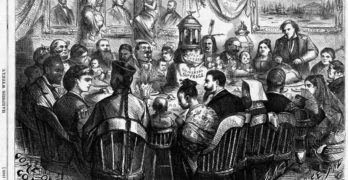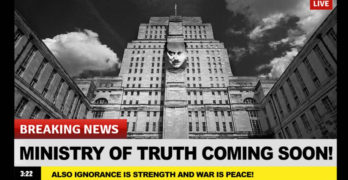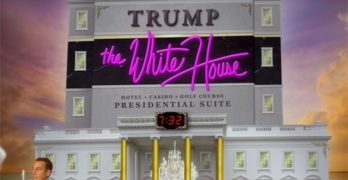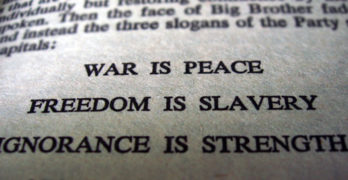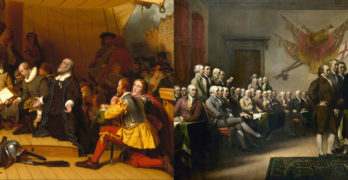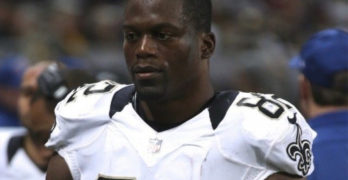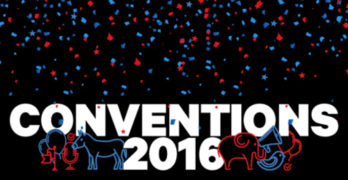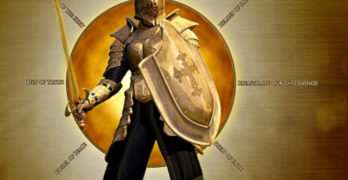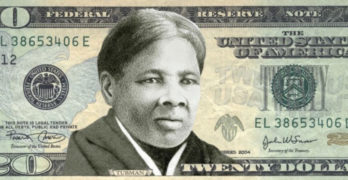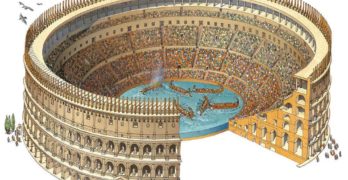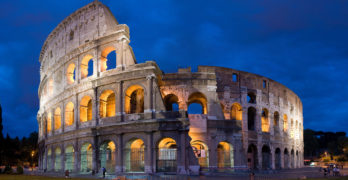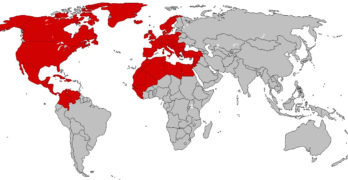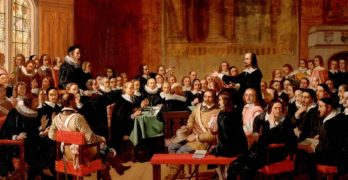 Warning: this is a very LONG post. Posted on September 10, 2012, Dr. R. Albert Mohler Jr Gregg Frazer, Author, The Religious Beliefs of America’s Founders: Reason, Revelation and Revolution
Warning: this is a very LONG post. Posted on September 10, 2012, Dr. R. Albert Mohler Jr Gregg Frazer, Author, The Religious Beliefs of America’s Founders: Reason, Revelation and Revolution
Mohler: This is Thinking in Public, a program dedicated to intelligent conversation about frontline theological and cultural issues with the people who are shaping them. I’m Albert Mohler, your host and president of The Southern Baptist Theological Seminary in Louisville, Kentucky.
The question of the religious convictions and the theological ideas of America’s founding generation continue to reverberate in very contemporary controversy. And no one’s better able to help us to interpret that controversy than my guest today, Professor Gregg Frazer, who is a professor of history at The Master’s College in California. Professor Frazer holds a Ph.D. degree from Claremont Graduate University.
Professor Frazer, welcome to Thinking in Public.
Frazer: Thank you; glad to be here.
Mohler: Your new book, entitled The Religious Beliefs of America’s Founders: Reason, Revelation and Revolution, published by the University of Kansas Press, seems to be a particularly well-timed book, given so many of the controversies that have emerged in evangelical circles even in just the last several weeks. But a project like this goes way back, in terms of your planning and interest. How did you come to write this book?
Frazer: Well, I’ve been interested in the subject of the religious beliefs of the founders for over 30 years. As I actually explain in the preface to the book, some 35 years ago, I was sitting in an audience listening to Peter Marshall and David Manuel talk about the light and the glory and trying to make a case for United States being established as a Christian nation, and, as an historian, I just didn’t think it sounded right. I thought that there were significant problems, and that launched me into 30 years really of studying this. And then when it came time to do a doctoral dissertation, that’s what I ended up doing as my doctoral dissertation, and that launched into, eventually, the book.
Mohler: In your introductory chapter, you write, “The founders of the United States believed that ideas have consequences. Some of the most important and powerful ideas held by men and women concern religion or religious belief. Because they are so important and powerful, religious ideas inevitably influence political thought and practice.” Now that would be one of those statements we would assume just about everyone would agree to be true, but when it comes to the founding fathers, we’re in uniquely controversial territory. In your book you lay out two different parties of historical interest who have varying and, you would thus argue, both erroneous understandings of the religious convictions of our founders. Can you lay that out for us?
Frazer: Yeah. Obviously one side are the Christian America advocates who argue that the founders were largely Christians and that they intended to create a Christian nation, and that the founding documents, the Declaration of Independence and the Constitution, were constructed on the basis of biblical principles, and that they wanted to establish a Christian nation.
And then that obviously has important consequences for today. On the other side are the secularists, the ACLU-types and so forth, who argue for a strict separation, wall of separation, between church and state. They argued that the founders were rank secularists or deists, and that they intended to separate religion from public life, and they have constructed this sort of wall of separation notion, which, by the way, I would argue, is not what the founders believe. And I would argue that both of those sides are wrong; that, in fact, the trust is somewhere in the middle.
Mohler: Somewhere in the middle or perhaps something that’s just completely different, in terms of the intellectual and theological layout. Professor Frazer, I’m interested in this primarily as a theologian. As a theologian, I have deep historical interest, and as an historical theologian, that’s a part of my academic terrain.
But, quite honestly, as important as the historical questions are and as definitive as I think your conclusion to these matters is, my greater concern, as we’ll see in this conversation, is that the theological issues have to be clarified. I mean, one of the problems is that when we talk about what these convictions are, the fact is people on both sides seem to have an inadequate understanding of what Christianity is.
So let’s look at the two parties. Let’s take the party, first of all, of the secularists. The academic historians and you rightly indicate that most of the academic historians basically hold to a rather secularist understanding of the founders, one most deeply suspicious of any authentic Christian content to their beliefs, and you would concede that you can read the founders that way if you are selective in what you read.
Frazer: Right. I think the reason that both sides are able to have followers, other than those who are just blindly following, is that, what I believe is their real—that is the key founders—what their real theology was, was a mixture of Christianity and natural religion, or deism, and rationalism. And they combined those three elements together into what I call “theistic rationalism,” and that’s the term that I coin for their religious belief system.
They took elements of Christianity and elements of natural religion and then, using rationalism, they kept what they thought was reasonable, was rational, and rejected what they considered to be irrational, and so if one wants to just look for—if one comes in with an agenda and one wants to demonstrate or prove that they were secularists, then one can find snippets in which they found that way if one chooses things conveniently. One can find places in which they sound like rank secularists.
On the other side, if one comes in with an agenda to show or to try and prove that they were Christians, one can find snippets in which they agree with Christian doctrine and Christian ideas, and sound Christian. But when one takes the totality of what they said and doesn’t use a lot of ellipsis (you know, the three little dots) to change the meanings of things, one finds that, in fact, they aren’t really in either one of those camps. They’re in the middle in what I call “theistic rationalism.”
Mohler: You provide also another overlay that I think is essential to the narrative that you’re setting out for us here in the interpretive grid, and that is the fact that those who were in the enlightened intellectual class of the founders of the United States of America, they held to certain ideas that they shared only with each other, and that there was a distinction in worldview between those who were in the intellectual elites and those who were in the masses. And the masses that were just deeply saturated in terms of Christian conviction and a Christian worldview, they heard the language used by the elites and assumed they meant the same thing, when actually that was not the case.
Frazer. Right; exactly so. The key founders that I write about were raised in this generally or nominally Christian culture and so they knew Christianity, they knew the language, they knew the terminology, and then they were educated in Enlightenment thought and rationalism. And then they were politicians, like politicians today, who know how to speak to an audience, they know how to speak publicly to appeal to their audience, just as politicians today do.
And so they were able to couch things in terminology that would keep them popular with the people, but when they talk to one another—and this is the focus of my research is on their private writings, on their personal correspondence with one another, their letters, and their diary entries, and personal memoranda, and I believe that’s when you really get at what someone believes is what they say in private that they don’t think others are going to see. And there we can see what they really believed as opposed to the public pronouncements or just, for example, denominational affiliations that some people focus on.
Mohler: Well, I think anyone with any kind of historical interest, and certainly knowledge, would understand that those denominators simply aren’t adequate, and, for instance, just say someone’s a Baptist as over against a Methodist might say something, but to say that someone’s a Baptist or an Anglican or an Episcopalian, could mean nothing more than the fact that one was born into a home where there had been some historic reference to that kind of denominational identification. But, at the same time, in the era of America’s founding, they couldn’t exactly identify themselves as infidels, so, in other words, there was a certain expectation of at least some allegiance to Christian identity; otherwise, they probably would not have had the public influence that was necessary
Frazer: Right; and for the most part they’re able to achieve that simply by attending church, which they did in a very public way, and particularly when they are in the public eye. George Washington, for example, his church attendance when he was back home in Mount Vernon was much more spotty than his church attendance when he was president because he thought it was important to set an example.
And they also held other beliefs that ran congruent with those of the general public, most prominent of which, most significant of which, is that they believed in a present, active God, which is one of the things that separates them from the deists. And they also believed in some written revelation, although they determined what revelation was valid or wasn’t according to their own reason, but at least they could then cite Scripture on occasion to give an illustration or to give an example. They could use a biblical illustration, which made, obviously, the public feel comfortable.
Mohler: One of the greatest achievements, I think, of your contribution here is the definitional contribution you make. And, as a Christian theologian, I’m always frustrated when I see the denominator Christian; Christian used as an adjective, without any substantial definition. And you’re very clear in your book that when you talk about Christianity, you’re talking about orthodox, biblical Christianity.
You’re talking about doctrines as you articulate, including the Trinity; the fact that God is active in human affairs; an affirmation of the deity of Christ; of original sin; the virgin birth of Christ; the atoning work of Christ; the substitutionary, satisfactionary form of understanding the atonement; resurrection; eternal punishment for sin; justification by faith; and the inspiration and authority of the Scripture. But then when it comes to deism, you also provide a definition that, quite honestly, is far more honest, I think, and objective than that that is often used in conversation about the founding fathers where the word deism is thrown around in a way that isn’t actually accurate, so define deism for us as you do in your book.
Frazer: My centerpiece of my argument is my conviction that the terms Christian and deist have been so broadly applied to the founders that they’ve become virtually meaningless categories. And this is largely due, I think, to the fact that these are the only two categories that have been generally accepted, and so people have been shoehorned into one of those identifications, whether they fit or not.
And then to make them fit, the categories get broadened, but, as you say, the definition of Christianity that I use here, what I actually did, because this is a work of history and scholarship, is I went back and I looked at the creeds and confessions of the 18th century American churches and put together a list of ten fundamental doctrines that they all agreed upon were central to Christianity. It just so happens that you and I agree with that said. It just so happens that they had a very, what we would say, orthodox view of Christianity in 18th century American. But where deism is concerned, there are really two fundamental, critical issues and then a third that’s also important.
The core issues for deism were the effective absence of God; that God created and then went on a hike, went on vacation. God left; He’s no longer present and active in the world. Or if He’s out there, He is just viewing as a spectator; He’s not involved. And the other is that there’s no written revelation from God; that there’s no revelation other than natural revelation. The deists believe that all we can know about God is what we can see in nature. And so those are really the two fundamental core elements of deism and then a third one that’s sort of a tangent is a criticism or a critical attitude toward Christianity, toward Jesus and toward Christianity in general.
And what I argue is that these are the fundamental core elements of deism just as the ten doctrines that you rattled off are the core doctrines, the fundamental doctrines, of Christianity. Whereas some Christians might add some things to the list of ten and some deists might add some things to the two or three elements of deism, everybody would agree who was a deist that if you don’t believe those fundamental things, you’re not a deist. And everybody would agree in the Christian community that if you don’t believe those fundamental things, you’re not a Christian. So really the definitions were constructed to say more who’s not a Christian or not a deist than who is a Christian or who is a deist.
Mohler: I’m intentionally refraining from moving to the question of the actual beliefs of the founding fathers and mothers of our country, in particular the founding generation, until we set the stage just a bit further. And, by the way, a good deal of my academic research has been in European deism in the 17th century.
The only thing I would add to your definition is the fact—and it’s implicit in your definition—is the fact that God has not only withdrawn Himself, but that He isn’t a personality, what we would call a personal God, and is more a moral force of energy. And so you put that altogether and you realize you’re talking about two completely incompatible worldviews, and that’s what makes the current confusion so perplexing. You have on the one hand, we know what a Christian is, and you did exactly the right thing, going to the creeds and confessions of the church that unanimously, in terms of the churches you mention, affirm these great Christian doctrines.
They’re the essential content of the Christian faith. And then you define deism, and then you wonder how in the world could it be that someone in the 21st century looking back to the 18th and the early 19th century could be looking at very specific individuals saying, “Are they deists or are they Christians?” How in the world could there actually be a debate about that given the incompatibility of those two worldviews?
Frazer: Again, I think the problem is that those two categories have become so amorphous and undefined that people just slide people into which ever category they prefer without really doing the work, without doing the scholarship. And when the terms are so murky and ambiguous as they have been made then—I read a number of works, biographies of these individuals and so forth, and some of them say, you know, that—say James Wilson, for example—some say that he’s a Christian and others say that he’s a deist.
Some say James Madison is a Christian; others say he’s a deist. Some say George Washington is a Christian; others say he’s a deist. And it’s just because these categories have been broadened and made so ambiguous and unclear that one could just stick people where one wants them, and this is part of my project is to try and brighten the lines a little and give a third option that I think is more reliable and more accurate.
Mohler: So let’s talk about the third option. We’ll do that when we come back with Professor Gregg Frazer.
Setting the story straight requires also setting the stage. That is, understanding the intellectual conditions and intellectual influences that explain the eventual thought of so many of the founders in America’s founding generation. Professor Gregg Frazer has helped us to understand this and that sets the stage for turning to the question of exactly what this theistic rationalism is and how so many of the founding fathers came to believe it.
Professor Gregg Frazer’s new book, The Religious Beliefs of America’s Founders: Reason, Revelation and Revolution, centers in the settlement of an argument that is old and extremely contemporary, and that has to do with what exactly the founding generation of America believed, and, specifically, what they believed in terms of the theological beliefs or, as he says in his book, religious beliefs. Professor Frazer suggests that there is no way we can reduce what they believe to the two options of Christianity and deism, and in his book he suggests a third option: theistic rationalism. Professor Frazer, define theistic rationalism for us:
Frazer: Theistic rationalism was a hybrid belief system, as I call it, mixing elements of natural religion, or deism, Christianity, and rationalism, with rationalism as the predominant element. And rationalism here I define as the idea that fundamental truth can be gained through reason basically.
And so, the adherents of theistic rationalism believed that these three elements of Christianity, natural religion and rationalism would generally complement one another, would generally take you to the same place, but, on occasion, when there’s conflict between them and you can’t ignore or resolve the conflict, then reason was to play the decisive role. So rationalism then is the noun and theistic is the describer, the descriptor.
Mohler: So what is theistic about theistic rationalism?
Frazer: Well, theism, if you go back to—what I did was try to go back to 18th century terms and terminology, which is another problem people have in this arena is they use terms before evangelicals or 21st century Americans that mean something today and meant something different back then when someone used them and they don’t explain the difference, but theism in the 18th century, if you go back to the 18th century dictionaries, was a term that was important because it was distinguished from deism. Theism is a belief in an active God, a present God.
So that’s basically the jist of it: is a belief in an active and present God. And so one can obviously fill in whatever one wants with that and we have, obviously, our beliefs concerning theism and the theistic God that we believe in, but one could basically have whatever view one wanted, but the key to the definition is that it separates it from deism. It’s a present, active God as opposed to the deist god.
Mohler: So let’s try to summarize this, and you do so in several points in your book. Theistic rationalism refers to a worldview that is not orthodox, in terms of its Christian identity, and it’s not deism because it can’t be reduced to the denial of a God who has any affairs with human kind and with His creation, and it doesn’t deny entirely any possibility of divine revelation, but it’s some kind of new thing, a new middle ground, and the theologian, the historical theologian in me, wants to point back to German rationalism and even German pietism as setting the ground for some of this, in terms of continental thought.
But here in the United States, you made very clear that this means that their primary worldview was rationalism. They really believed that human reason was the vehicle by which truth could be known and determined, and that was modified by their theism, by their belief that there was a God, that He was in some way involved with human affairs, especially, I would argue, morally, and that there was at least a revealed ethic to which human beings were to be submitted.
Frazer: Absolutely, and for them the critical element in religion was morality. And this is part of where the left is wrong with their wall of separation notion and the idea that the founders wanted to keep religion out of public life. Quite the contrary, what they had to struggle with was the fact that they were creating society; they were creating a republic, a free society, without the iron fist of the government controlling people.
And so the question they then had to deal with was, “How do you control such people? How do you get them to behave?” And their answer was that you get them to behave, you control them, through morality. And where do you get morality? You get it through religion. So they did not want to divorce or separate religion from public life; rather, they believe that religion was a necessary support of public life, as Washington and Adams and others said quite frequently, by the way.
So they believed that morality was indispensible for a free society and that religion was the best source for morality, and so this wall of separation idea that the left has come up with is simply not the view of the founders. And so, back to their view of God, they again, borrowing notions of Christianity, they then threw out what they thought was irrational of the notions of God and their real focus concerning the attributes of God was on benevolence. That was the fundamental attribute that they believed of God.
That’s what their reason told them that if there is a God and He created people, His primary motivation, His primary attribute would be benevolence—to be kind and good to those people. And, therefore, they jettisoned whatever beliefs they found to be irrational in light of the benevolence of God; things such as, for example, eternal hell. They didn’t believe in eternal hell because they thought that was irrational that God—as many people struggle with today—that God would create man only to confine him to hell. And so they believed in a temporary punishment after death, but that eventually everyone would end in heaven.
Read the Whole article Here






